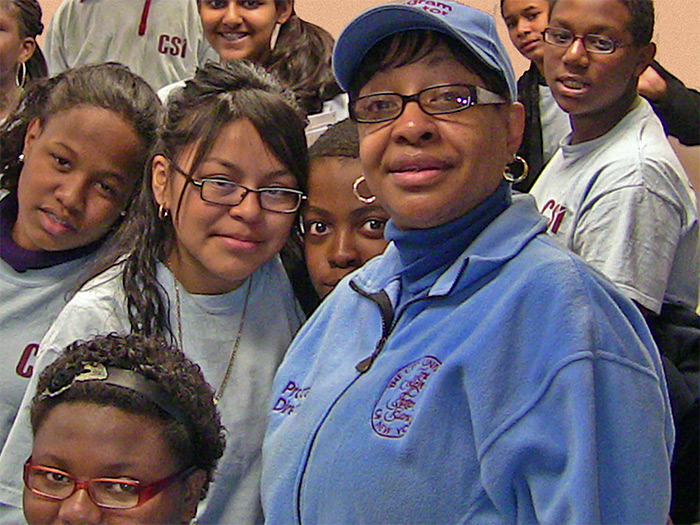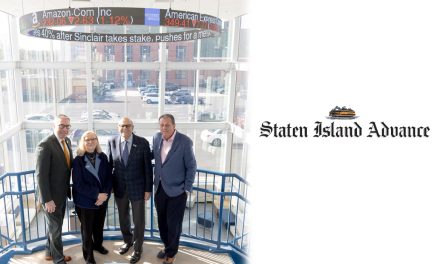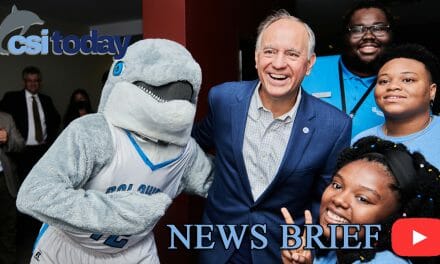Debra Evans-Greene has a long and impressive track record at CSI of working to ensure that students from historically underrepresented groups get their diplomas, both at the college and high school levels. However, beyond her official capacity as a director of student retention programs such as the Science and Technology Entry Program (STEP), the Collegiate Science and Technology Program (CSTEP), and the College Success Initiative/Black Male Initiative (BMI) program on campus, many CSI students throughout the years have come to know her as their special friend and mentor, thanks the guidance that she has given them throughout the years.
View the carbon neutral interactive edition of Eye on CSI.
A Long Association with the College
Evans-Greene was focused on pursuing her baccalaureate education at CSI as a Nursing major, but soon gravitated to sociology, a discipline that gave her a brand new outlook on life at the old Sunnyside Campus, where she worked for the Dean of Students. In the spring of 1999, she received her Associate’s degree in Liberal Arts, and Bachelor’s degree in Sociology/Anthropology. “I became interested in cultures, interacting with people, and learning about different cultures, particularly African American culture,” she recalls. “Basically, I learned about different cultures and how people perform the way they do, why people act the way they do, and it became interesting because oftentimes you don’t know why people do what they do. It’s because of the environment they come from. It’s because of the cultures in which they live.”
Evans-Greene began working as a college assistant with the STEP program and interned with the Liberty Partnership program [LPP]; these programs later fell under the direction of the Discovery Institute. “I was working with [now NYC councilwoman] Debi Rose and I was going into the schools.” Evans-Greene says. “I was an older student coming back to college; I began working as an LPP intern to help with the cost of transportation to and from school; as I began working with the students at New Dorp High School, I really developed a passion for working with young people. I began to realize the relationships I was building with students in grades 9 thru 12. The first year, when I started, there were students who would come to me and discuss personal issues, I would give them a little bit of advice; however, I did not realize some of the students were actually taking the advice I was giving them and using it. When students graduate, they would ask me to come to their graduations. Students wanted my home number, so I started reaching out, giving them my number and they would call. I thought, ‘Wow, I am making a difference in someone’s life.’ I became like a family member to some of the young people I worked with. I got such a good feeling, which developed into a passion for me.”
Beyond her interest in sociology and what makes people tick, many of the lives of the students with whom she dealt were extremely difficult, and, although she faced a number of obstacles herself, this struck a deeper chord. “I was a single parent and the challenges of trying to pursue an education while working full-time, and rearing a child were very, very difficult. The students I was talking to—I was kind of their mom, sister, counselor, and mentor. I was looking at them and the challenging issues that they were facing. Being a single parent, I had no idea of some of the issues my students were facing—my challenges were nothing compared to these precious young people. Based on my personal life experiences, I felt that I could perhaps help in some way. You see, losing my dad at age 15 and my mom at 16 was extremely difficult. Young girls, 16 years old, need their mom and dad. Family members stepped in, but nonetheless, there is nothing like your parents. “I think that was a pivotal point in my life as I reflect back to my teenage years.” I reached out to students…I kind of took on that role and served as a mother figure to them.”
Evans-Greene’s connection with the Discovery Institute deepened as the years progressed. She was offered the position as STEP program coordinator; learning the intricate workings of the program moved her on to bigger roles. She served as the CSTEP coordinator and then, director of STEP and CSTEP. Because many of the students in the BMI/College Success Initiative program had similar situations to the students whom she was already serving, Evans-Greene also assumed the role of BMI project director.
A Director with Many Directions
College Success Initiative Program/ BMI
In its fifth year, funded through the New York City Council, formally known as the Black Male Initiative program, the program was created in response to the decreasing enrollment numbers among Latino and African American males at CUNY colleges. Evans-Greene explains, “There were several African American males leaving CUNY institutions, and the question was why, so the CUNY Chancellor, Matthew Goldstein, established a University task force to find out which issues minority males faced on CUNY campuses that prevented them from staying focused through graduation.” In her capacity as Director, Evans-Greene collaborates with CSI faculty and staff to challenge these issues, and works with assistant principals at Curtis and Port Richmond high schools, attempting to create a pipeline from high school to college. College Success Initiative/BMI students in good academic standing, known as BMI Ambassadors and Scholars, “go into the high schools and tutor high schools students who are having difficulty with math. This year we also reached out to the English Department as well as the History Department at Port Richmond and Curtis high schools,” Evans-Greene notes. The BMI Ambassadors and Scholars receive $10 per hour for their mentoring and tutoring efforts. These students are also beginning to hone their own academic skills, and the high school students have role models with whom they can relate. CSI students who are below the minimum academic requirements (2.0), shadow the BMI Scholars in the schools until their grades are up to par; they then become tutors and mentors.
There is also a College-end aspect to the Initiative, where CSI professors reach out to CSI students and serve as role models to ensure that the students stay on track academically. This year’s first BMI learning community was a huge success.
Science and Technology Entry Program (STEP)
The Science and Technology Entry Program (STEP) is a state-funded program. “This is geared toward individuals who have been historically underrepresented in the professional fields—it’s leveling the playing fields in science, technology, and engineering and education,” Evans-Greene explains. “Also, this is a program for students who are interested in becoming math and science teachers as well. Our summer program is for students going into seventh grade the following fall. Students come to campus for 12 days in July and engage with hands-on science activities. Our academic program takes place for 27 weeks when the College is in session on Saturday morning, when students in grades 7 through 12 engage in scientific experiments. Each student has to produce an oral presentation at the end of the fall program, and each has to produce an individual science project at the end of the spring program. College students, who are taking science courses themselves, work with the younger students and they serve as mentors and tutors in the classrooms. We want to expose [the younger students] to the college environment so they develop a true understanding for college.”
Collegiate Science and Technology Entry Program (CSTEP)
Evans-Greene also oversees this 12-day summer program that recruits 20 to 30 incoming freshmen each year (with an 80 average or above) with an interest in pre-med, scientific research, computer science, engineering, biology, chemistry, and science or math education. Students experience the College environment before actually beginning classes. Students meet with College faculty and key staff personnel, and engage in chemistry, engineering, and biology labs. By the time most students become sophomores, they are interested in research and work with professors in the science labs. Students serve as interns and get hands-on experience in their chosen fields.
Making a Difference, and Attracting Attention
For the past 20 years, Evans-Greene has made a positive impact on so many students’ lives through her diligent efforts at the College of Staten Island, but also because of her humanity and dedication. Thanks to her commitment to the City’s youth, Debra Evans-Greene has received two citations from the New York City Council; the educational award from the New York Urban League; a community service award from the 369th Veterans Association, a letter of commendation from CSI President Dr. Tomás Morales for her work with the College Success Initiative, and numerous of plaques from her students, thanking her for helping them to believe in themselves, which to Evans-Greene, is the best part of her multifaceted job.
Looking toward the future, Evans-Greene, who now holds a Master’s degree in Urban Affairs from Queens College/CUNY, is hoping to pursue a Doctorate in Urban Education.
















